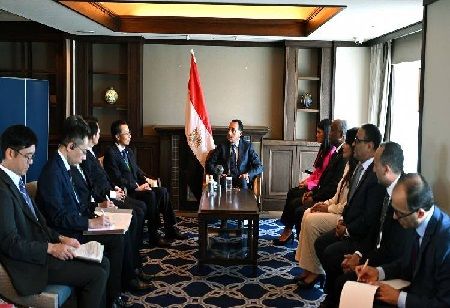- Egypt’s Education Minister Mohamed Abdel Latif signs MoUs with Japanese institutions at TICAD 9 to boost education cooperation
- Deals include a new Japanese-style math curriculum for grades 1-12 with Sprix, and a teacher training program with Casio Middle East for effective use of calculator applications
- Abdel Latif highlights collaborations as models of global partnership, strengthening Egypt’s education reforms and human capacity building in line with Africa-Japan cooperation goals
Egypt's Education Minister, Mohamed Abdel Latif, signed several deals with Japanese education institutions at the 9th Tokyo International Conference on African Development (TICAD 9), highlighting Egypt's affirmation of global cooperation in education.
During his visit, Abdel Latif also signed a memorandum of understanding with Sprix, which is a Japanese education firm, to develop a mathematics curriculum for grades 1 to 12. The curriculum will follow the Japanese model and will seek to enhance the basic skills in mathematics among students while promoting overall academic achievement. In yet another agreement, the minister signed a protocol with Casio Middle East for training mathematics teachers in preparatory schools. The training will involve the effective utilization of calculator applications using user manuals to improve teaching and assist students in attaining improved performance in class.
Commenting on these collaborations, Abdel Latif stated the projects demonstrate Egypt's increasing and successful cooperation with Japan in the education sector. "These collaborations leverage Japanese knowledge to improve the education quality in Egypt and prepare our students with more powerful scientific and knowledge-based capabilities", he clarified. He underscored that these projects illustrate how global collaborations can reinforce human capacity building, especially through knowledge transfer and training teachers.
Also Read: The Impact of Teacher Training Programs on Educational Quality
The minister further emphasized that these accords are more than bilateral relations. They attest to a like-minded vision of further developing education as a building block of sustainable development, particularly within the larger context of African countries cooperating with Japan. "This cooperation is a shining example of how nations can consolidate efforts to facilitate investment in human capital and pursue common development objectives", Abdel Latif said.
The agreements are made at a moment when Egypt is persistently developing its education reforms, with both curriculum development and teaching training being identified as areas of needed improvement. Through the adoption of successful international models like Japan's, Egypt seeks to update its education system and equip students with the capability to survive in a fast-changing world.
Through these new efforts, Egypt not only reinforces its education links with Japan but also positions itself as an active player in fostering stronger global partnerships to sustain development and growth throughout Africa.

